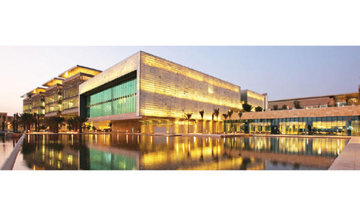DAMMAM: As Saudi Arabia rapidly evolves into a global technology hub, the convergence of artificial intelligence and 5G technology is playing a critical role in reshaping the Kingdom’s digital landscape.
The fusion of these cutting-edge technologies is transforming devices beyond conventional smartphones, creating smarter systems that enhance industries ranging from telecommunications to manufacturing and healthcare.
Saudi Arabia’s commitment to digital transformation, outlined in its Vision 2030 initiative, has propelled the Kingdom toward large-scale adoption of AI-driven technologies, supported by the rollout of 5G networks.

With AI’s predictive power and 5G’s ultra-fast connectivity, the Kingdom is poised to become a leader in deploying next-generation smart devices that transcend traditional communication tools.
AI algorithms now have the ability to anticipate user needs, infer intent and automate tasks, creating seamless user experiences and improving productivity.
According to a recent PwC report called “The Smarter Phone,” AI-enabled smartphones are already integrating with daily activities, leveraging predictive analytics to automate routine processes and provide real-time solutions.
AI-powered assistants, image recognition and voice command systems are increasingly becoming integral parts of mobile devices, enabling more intuitive user interfaces and features such as facial recognition, automated photo sorting and smart scheduling.
This evolution of mobile technology not only improves productivity at work but also frees up time for leisure.
As Saudi Arabia embraces this digital transformation, its telecommunications sector is at the forefront of integrating AI into 5G-powered networks.
“The country’s commitment to advanced technologies and its focus on digital transformation highlights the importance of AI, both globally and locally,” Raghav Sahgal, president of Nokia’s Cloud Network Services Group, told Arab News.

Raghav Sahgal, president of Nokia’s Cloud Network Services Group. (SUpplied)
At the heart of this transformation is 5G technology, which offers faster speeds, lower latency and greater connectivity capacity than its predecessor, 4G.
Its ability to transfer data at rates of up to 10 gigabytes per second allows for seamless communication between devices, supporting emerging technologies such as autonomous vehicles, smart cities and the internet of things.
When combined with AI, 5G enables the real-time processing of vast amounts of data, making way for new applications that were previously unimaginable.

5G technology offers faster speeds, lower latency and greater connectivity capacity than its predecessor, 4G. (Supplied)
One of the most transformative aspects of 5G in Saudi Arabia is its potential to digitize industries.
“5G is enabling the digitization of industries by offering deterministic and reliable connections that are critical for sectors such as petroleum, gas and manufacturing,” said Sahgal.
By leveraging 5G’s speed and reliability, companies in these industries can improve operational efficiency, reduce downtime and optimize processes through AI-powered predictive analytics.
Nokia has played a pivotal role in Saudi Arabia’s AI-driven telecom revolution. Its AVA platform (Automation, Visualization, Analytics) bundles together its software portfolio, allowing telecommunications providers to secure, automate and monetize their 5G networks.

Nokia’s AVA platform combines AI and automation to enhance telecom performance, security and reliability. (Supplied)
The platform’s AI-driven analytics and automation tools provide telecom operators with actionable insights to enhance network performance, security and reliability. This is particularly important as Saudi Arabia’s telecom companies continue to expand their 5G infrastructure.
Telecommunications giants such as Saudi Telecom Company, Mobily and Zain KSA have embraced AI-driven systems to optimize 5G networks as well as enhance the user experience.
STC has implemented Nokia’s AVA platform to automate and optimize its 5G networks. By using AI, the company can monitor and predict network performance, addressing potential issues before they impact customers.
DID YOUKNOW?
AI and 5G are powering Saudi Arabia’s Vision 2030 goals, accelerating digital transformation across industries like manufacturing, telecom and healthcare.
5G enables data transfer rates of up to 10 Gbps, allowing seamless device communication in areas such as IoT and autonomous vehicles.
Saudi telecoms are adopting AI for network optimization — STC, Mobily, and Zain KSA enhance customer experiences using AI-driven solutions.
Nokia’s AVA platform combines AI and automation to enhance telecom performance, security and reliability in Saudi Arabia’s 5G networks.
Mobily has integrated AI into its 5G networks, using it to manage network resources efficiently and provide real-time service improvements.
Zain KSA, another key player in the Kingdom’s telecommunications sector, utilizes AI to manage 5G network slicing, a feature that allows telecom providers to tailor services to different user cases, ensuring optimal performance for each.
Indeed, in addition to network optimization, AI is transforming customer service within Saudi Arabia’s telecom industry. AI-powered virtual assistants and chatbots provide personalized, real-time support, helping customers resolve issues quickly and efficiently.
AI is also being used to enhance security, with applications such as fraud detection and network protection playing crucial roles in safeguarding users’ data and privacy
As Saudi Arabia continues to invest heavily in AI and 5G technologies, the convergence of these innovations is expected to have far-reaching implications for the Kingdom’s economy.
AI-enabled devices will not only enhance consumer experiences, but will also contribute to the Kingdom’s broader economic goals by improving efficiency, productivity and innovation across various industries.
The convergence of AI and 5G in Saudi Arabia is creating a new era of smart devices that go far beyond the traditional smartphone. These technologies are driving the digital transformation, enabling the Kingdom to build a more connected, efficient and innovative future.

































